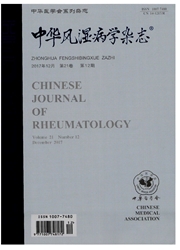

 中文摘要:
中文摘要:
目的检测类风湿关节炎(RA)患者血清中肿瘤坏死因子样配体1A(TL1A)的水平,分析其在RA中的临床意义。方法收集RA患者血清100例和健康对照者50名,采用双抗体夹心酶联免疫吸附试验(ELISA)测定血清中TL1A水平,并分析血清TL1A水平与RA各临床和实验室指标的相关性,计量资料,符合正态分布采用t检验,非正态分布采用Mann—WhitneyU检验,计数资料比较采用r检验,相关性分析采用Spearman相关分析。结果RA患者血清TL1A水平为(959±1146)pg/ml,显著高于健康对照组[(529±154)pg/ml,t=3.683,P〈0.01];并且类风湿因子(RF)、隐性类风湿因子IgG(HRF—IgG)、抗环瓜氨酸肽(CCP)抗体阳性组TL1A水平[分别为(962±1043)、(833±1104)、(908±1115)pg/ml]均高于阴性组TL1A水平[分别为(628±343)、(576±134)、(628±401)pg/ml],差异有统计学意义(t=3.224,1.317,1.003;P均〈0.05)。另外,1]L1A阳性组RA患者的RF、HRF—IgG以及抗CCP抗体阳性率(分别为90%、42%、85%)均较TL1A阴性组患者(分别为56%、11%、33%)显著升高(x2=-0.372,-2.402,-2.774;P均〈0.05)。结论TL1A在RA患者血清中表达增高,并与多种自身抗体(包括RF、HRF—IgG和抗CCP抗体)密切相关,可能是RA预后不良因素之一。
 英文摘要:
英文摘要:
Objective To analyze the correlated clinical significance by testing the serum tumor necrosis factor like ligand-1A (TL1A) levels of patients with rheumatoid arthritis (RA). Methods The serum from 100 RA patients and 50 healthy controls were selected. The serum TL1A concentrations of the two groups were detected by ELISA. The correlations between serum TL1A levels and clinical features or laboratory examinations of RA patients were investigated. Mann-Whitney U test, t-test, )(2 test and Spearman correlation analysis were used for statistical analysis. Results The levels of serum TL1A in RA patients [ (959±1146) pg/ml ] were significantly higher than those of the healthy controls [ (529±154) pg/ml, t=3.683, P〈0.01 ]. The levels of serum TL1A in RA patients with positive rheumatoid factor (RF),occult rheumatoid factor immunoglobulin G (HRF-IgG) and anti-cyclic citrullinated peptide antibodies (anti-CCP) [(962± 1043 ), (833 ± 1104), (908± 1115 ) pg/ml, respectively ] were significantly increased when compared to those in RF, HRF-IgG and anti-CCP negative RA patients [(628±343), (576±134), (628±401) pg/ml, respectively, t=3.224, 1.317, 1.003; P〈0.05]. The positive rates of RF, HRF-IgG and anti-CCP in the TL1A positive group(90%, 42%, 85%) were significantly higher than those of the TL1A negative group (56%, 11%,33%) (x2=-0.372, -2.402, -2.774; P〈0.05). Conclusion The level of serum TL1A is significantly elevated in RA and it is significantly associated with auto-antibodies in RA including RF, HRF-lgG and anti- CCP antibody, which may be a factor for unfavorable prognosis of RA patients.
 同期刊论文项目
同期刊论文项目
 同项目期刊论文
同项目期刊论文
 期刊信息
期刊信息
